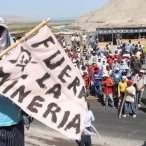English · Español

1 September 2015 | Interviews | Extractive industries
Interview with Peruvian journalist Juan Jose Mamani about his experience in the resistance against extractivism in Valle del Tambo
Download: MP3 (1.7 Mb)
Four dead people, tens of injured people, 80 people prosecuted for “mining terrorism” and a State of Emergency for 60 days in 2015 is the result of the resistance to the mining project Tia Maria, in Arequipa, a region considered the “judicial capital of Peru”.
However, the men and women living in Valle del Tambo are resuming their protests. These people have strongly stated in a popular consultation held in 2009 that they are farmers and they don´t need this extractivist project promoted by transnational Southern Copper Corporation.
Recently, the company was accused of informing about the effects of its exploitation in the capital city, Lima, but not in the communities that would be affected. For this reason, a “door to door” campaign was announced, which could increase the level of the social conflict caused by this industry.
Real World Radio interviewed journalist Juan Jose Mamani about this. Mamani told us about his experience in the struggle and he made reference to the main challenges faced by the resistance in Valle del Tambo. In particular, he highlighted the role of massive and alternative communication media in the anti-mining conflict, as well as the situation of the journalists identified with the community mobilizations.
He also said that the Peruvian government led by former military officer Ollanta Humala “has criminalized the social protest”, which added to a campaign to distort the facts by business communication media, has served to increase social pressure and the rejection to mining of Mexican-US origin.







